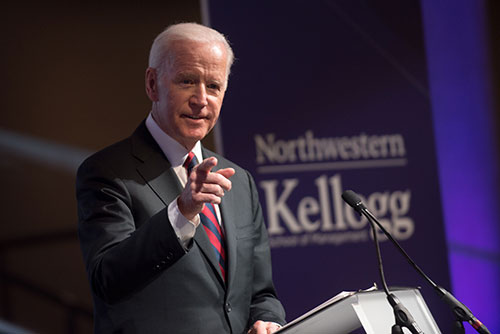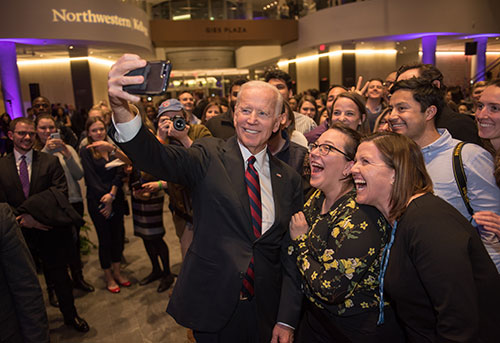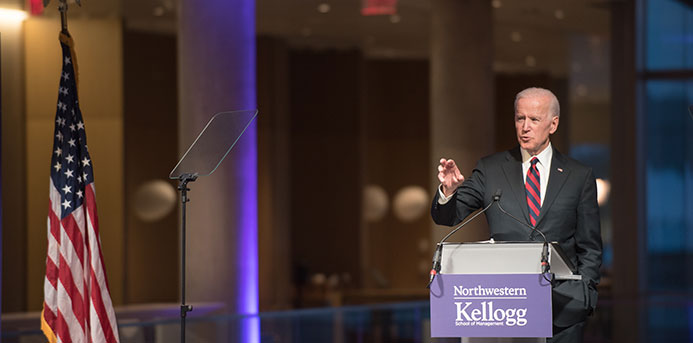Last Friday, March 9, former Vice President Joe Biden took the stage in the soaring three-story atrium of Kellogg School of Management’s Global Hub building on Northwestern University’s Evanston campus. The packed house consisted primarily of Kellogg School of Management students, with Biden’s speech made accessible to the public via live stream.
Kellogg Dean of Students Sally Blount opened the event, briefly noting the many Kellogg alums who have careers in government and public service and highlighting the school’s emphasis on its Kellogg Public Private Initiative, which focuses on necessary intersection of business and public policy. Following Ms. Blount, Ben Harris, the former chief economist for Vice President Biden and a Kellogg visiting professor, gave a brief introduction to his former boss. Mr. Harris recounted that the universal reaction to Biden, in his experience, had been that Biden is “genuine, authentic, and he gets it.” After Harris’ remarks, Biden entered the stage to thunderous applause from the crowd. Here are some of the highlights from his speech.
“Flattery is great as long as you don’t inhale,” a quote attributed to Adlai Stevenson, was Biden’s means to opening his remarks. He then appealed to the audience, giving some flattery to Chicago, noting his family connections to the area, and his own perception that Chicagoans claim to have invented almost everything, from ice cream to drawbridges.
Women in the workforce
The first portion of Biden’s speech was dedicated to observations on women in the workforce. He noted that Kellogg was the only top ranked business school with a female dean, and then spoke of a Chinese expression, translating as “women hold up half the sky.” Biden suggested that for a 21st century society to succeed, it must harness all of its brain power. Addressing the women in the audience specifically, he said there is nothing that men can do that women cannot.
Tackling geographic inequality
In his speech, Biden focused on inequality not as it relates to rich versus poor, but rather the U.S.’s geographic inequality. Biden gave examples of thriving communities that have rebounded immensely from the Great Recession, those such as Silicon Valley, New York City, Seattle, Boston, and Houston — cities that attract the best minds in the world and the money that flows to those centers of intellectual capital. Biden contrasted this with cities in the South and industrial Midwest that have seen stagnant wages and growth and a subsequent brain drain.
The causes of these geographic inequalities, according to Biden, are state laws that discriminate against labor, a hollowing out of the labor movement itself, rapid technological change, and globalization — such as the loss of manufacturing jobs to China. Biden also lamented the sense of despair in these communities that have been left behind, mentioning the decline in life expectancy in these areas for men age 40-48, with contributing causes such as feelings of depression and despair, leading to opioid abuse in increased suicide rates.
Biden continued discussing the situation facing the geographic areas that have been orphaned in the current economic expansion. He explained that political and social stability are derived from aspiration and the belief that aspirations can be realized. The U.S was on the right track: Poorer states, from 1890-1988, were closing the prosperity gap with their richer counterparts. However, that trend reversed 30 years ago and since then the gap has begun to widen again. Biden cited reasons for this change such as states cutting funding for education, healthcare, neglected infrastructure — from roads to water pipes — a tax system that favors the investor class, and labor laws that restrict workers from realizing their full potential.
Problematic labor laws
Biden noted some of the specific labor laws that have been hurting labor, while protecting ownership and management. He called for the abolition of non-compete clauses, unnecessary licenses for many occupations, laws that prohibit employees from disclosing their pay to fellow workers, and the misclassification of employees as management in order to deny them overtime pay. According to Biden, all of these laws inhibit the basic abilities of workers to offer their services at their true market value. Biden discussed further hindrances to prosperity, such as the dismantling of Obamacare, destabilized community units, the cost of higher education, crime, unequal access to broadband, and threats caused by global warming.

Hope for the future
But it’s not all doom and gloom. Biden pivoted, telling the assembled crowd, before we despair, we must face the future head on. He says poor geographic areas can change their fortunes and that their fate is in the hands of our leaders. He addressed questions of education by proposing 14 years of free, non-means-tested education for all students. An associate’s degree, according to Biden, translates to $9,000 a year in additional income for workers versus those with only a high school diploma. Biden also touched on recent tax reform, arguing that tax cuts should have gone to wage earners and also argued for expansion of the Childcare Tax Credit. His tax philosophy in a nutshell: If tax expenditures can’t be done for social good or to increase labor productivity, the expenditures cannot be justified. To further sum up his position, Biden rejected critics, saying, “We can afford these things.”
Biden chose to wind down on a hopeful note. He praised the productivity, optimism, and innovation of the American people, noting how fortunate we are to have robust natural, economic, and educational resources.
Over the course of his speech, Biden vacillated between speaking loudly into the microphone, channeling a politician on the campaign trail, while at other times taking a soft and serious tone. He quoted Richard Hofstadter and David Brooks, and gave anecdotes about his interactions and relations with foreign leaders such as Shinzo Abe and Xi Jinping.
Mr. Biden closed his speech with a call for strength and action, saying to the crowd, “Ladies and gentlemen, pick your heads up, this is the United States of America, not a damn thing we can’t do.” Following his last words, the crowd gave Biden a standing ovation, and happily posed for a giant selfie with the beaming former Vice President.

More from Make It Better:
- Notes From the Women’s March in Washington, D.C. — One Year Later
- Overcoming Gender Bias in the Workplace — What Women and Organizations Can Do
- 6 Empowering Tips for Every Woman From Smith College President Kathleen McCartney
Joshua Streckert is the founder and managing partner of SJ Equity Partners, L.P., a private investment partnership focusing on short-term long/short equity-trading strategies. Previously he worked in fixed-income derivatives trading, valuations, and risk management for Lehman Brothers and Bank of America. A graduate of Northwestern University, he is passionate about supporting his alma mater, as well as the American Red Cross.

